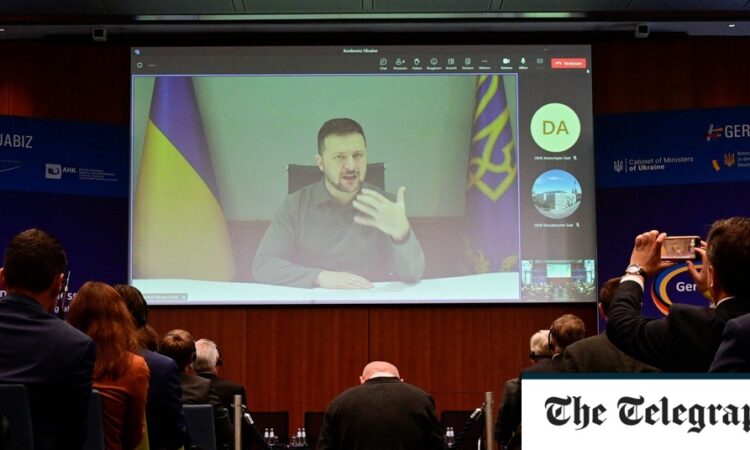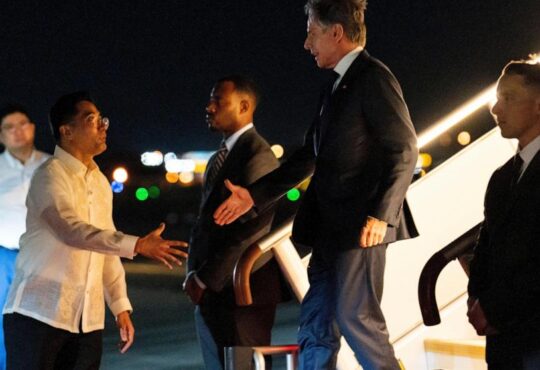
Assistant Comment Editor Francis Dearnley speaks about the latest developments from Ukraine’s application to join the EU.
When discussing Ukraine in the European context, we are often obliged to ask what Ukraine would gain from membership of the European Union and NATO, and less what the European Union and NATO could gain. But President Zelensky has this morning been keen to stress today what he sees as the strategic advantages for Europe in the long-term of Ukraine’s tilt Westward, aside from the strength of its armed forces, and the work that is underway within the country to prepare itself for membership.
“Our Europe is at a special moment,” he says, “For decades, it has been separated into two territories: one where our common values are protected by European institutions, and another where they are not. Now, at last, we are a few geopolitical steps away from eliminating this division.”
“Since the collapse of the so-called “Eastern Bloc,” the lack of geopolitical certainty has been the greatest threat to life in Europe. It attracted crises like a magnet and tempted enemies of the European way to fight against European unity. Because even the smallest gray geopolitical zone provokes claims to dominate it. Various political forces try to paint it their own colors. Now is our historic chance for the whole of Europe to remove the lack of geopolitical certainty, this source of crises and problems.”
Interestingly, this corresponds with the analysis of historian James Carafino in the podcast last week he was keen to emphasise just quite how economically transformative that could be: so much so that Europe would be able to contain Russia and be largely unaffected by what it does – something that has not been the case before now. That interview was on Day 599, and offered some food for thought, so I recommend it.
Francis goes on to detail some of the efforts of Volodymyr Zelensky’s government to clean up its international image to persuade EU countries that Ukraine is ready for membership.
It has been noticeable in recent months the number of high profile figures who have been charged: Igor Kolomoisky, once considered Zelensky’s chief patron, was jailed last month suspected of fraud and money laundering. In May, Ukraine announced it suspected businessman Dmytro Firtash, who is wanted by the US, and companies under his control of stealing up to $485 million in a “large-scale scheme” involving Ukraine’s gas transit system. Authorities also seized more than $375 million worth of assets they said belonged to exiled billionaire Vadim Novinsky, whom they allege aided Russia. All deny wrongdoing.
As we have discussed many times, war is the engine of history; accelerating processes already taking place, and creating new possibilities. If ‘politics is the art of the possible’, then war often redefines what is perceived as possible – for good or ill.
Listen to Ukraine: the Latest, The Telegraph’s daily podcast, using the audio player at the top of this article or on Apple Podcasts, Spotify, or your favourite podcast app.
War in Ukraine is reshaping our world. Every weekday The Telegraph’s top journalists analyse the invasion from all angles – military, humanitarian, political, economic, historical – and tell you what you need to know to stay updated.
With over 55 million downloads, our Ukraine: The Latest podcast is your go-to source for all the latest analysis, live reaction and correspondents reporting on the ground. We have been broadcasting ever since the full-scale invasion began.
Ukraine: The Latest’s regular contributors are:
David Knowles
David is Head of Audio Development at The Telegraph, where he has worked for nearly three years. He has reported from across Ukraine during the full-scale invasion.
Dominic Nicholls
Dom is Associate Editor (Defence) at The Telegraph, having joined in 2018. He previously served for 23 years in the British Army, in tank and helicopter units. He had operational deployments in Iraq, Afghanistan and Northern Ireland.
Francis Dearnley
Francis is assistant comment editor at The Telegraph. Prior to working as a journalist, he was chief of staff to the Chair of the Prime Minister’s Policy Board at the Houses of Parliament in London. He studied History at Cambridge University and on the podcast explores how the past shines a light on the latest diplomatic, political, and strategic developments.
They are also regularly joined by The Telegraph’s foreign correspondents around the world, including Joe Barnes (Brussels), Sophia Yan (China), Nataliya Vasilyeva (Russia), Roland Oliphant (Senior Reporter) and Colin Freeman (Reporter).






